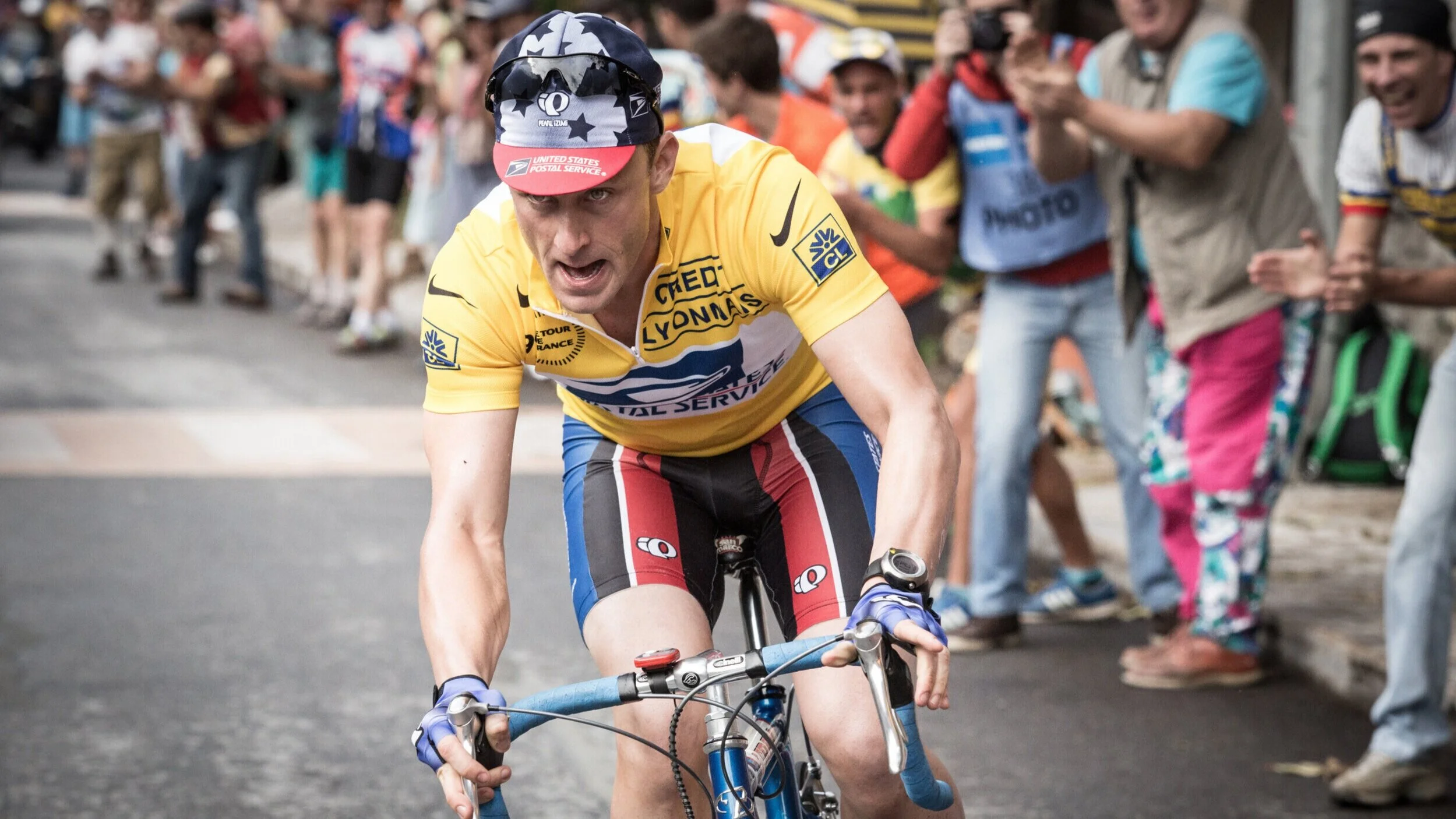The Program
A sports legend’s tale meets few hurdles.
Ben Foster in full gear
Watching this film by the veteran British director Stephen Frears (The Queen, Philomena) I could not help comparing it with another movie by a well-established filmmaker, Ron Howard’s Rush of 2013. It is, of course, the case that Rush dealt with Formula One motor racing whereas The Program is concerned with cycling – most notably the Tour de France – and those drawn to either movie through a strong interest in the sport concerned would be unlikely to compare the two. Nevertheless, anyone who shares my own lack of enthusiasm for sport and goes to such films looking for an effective dramatic story may well be drawn to make this comparison.
As it happens The Program and Rush are also linked by the fact that each chooses to tell a tale with a strong cast at a time when the sport featured had already been the subject of a memorable documentary. Rush may have been about the rivalry between those highly contrasted drivers James Hunt and Niki Lauda, but it was still impossible not to be put in mind of Asif Kapadia’s Senna (2010) because in that film the portrait of Ayrton Senna utterly enticed the viewer whatever their degree of interest in Formula One. With The Program we are haunted even more directly because Frears’ film is all about Lance Armstrong, himself the subject of Alex Gibney’s 2013 documentary The Armstrong Lie.
I am firmly convinced that critics should be careful not to give away any developments that add surprise to a story, but in the case of Armstrong what can be thought of as the twist in the real-life tale is probably even better known than what preceded it. So I will merely say that the rest of this particular paragraph should be skipped by anybody who has no idea what I am talking about. The Program is scripted by John Hodge and tells Armstrong’s story in chronological order. Thus we learn of how this young American cycled in the Tour de France in 1993 and then, ignoring criticism of his suitability for this sport, went on to achieve success in it. That was dramatically interrupted when he was diagnosed with testicular cancer. His recovery after surgery created its own headlines, but these were soon outdone by his returning to the sport with greater success than ever: be it as a regular winner of the Tour de France or as the founder of a cancer-research charity, Lance Armstrong was not just a champion but a national figure. That was why Gibney wanted to make a film about him, but he had to reshape it entirely when it emerged that, contrary to Armstrong’s earlier denials, the cyclist had been taking drugs regularly to enhance his prospects. Thus it is that Armstrong’s story is that of a hero who then falls from grace.
Consequently, Hodge, basing his screenplay on the book about Armstrong by the Sunday Times reporter David Walsh, has plenty to work on and the drama is readily sustained on screen helped by good performances from a cast headed by Ben Foster (Armstrong), Guillaume Canet (medical adviser Dr. Michele Ferrari) and Jesse Plemons, the latter as a younger racer, Floyd Landis, who would play a not insignificant part in the later stages of these events. Rather strangely Dustin Hoffman turns up giving an able cameo performance, the oddity of it lying in the fact that this is a standard supporting role rather than one calling out for a star presence. Given the talent involved, it is not surprising that The Program will provide a good evening out. However, it is when one makes the comparison with Rush that it becomes obvious that this is the lesser film of the two. The reason is to be found in the screenplay.
In reaching that conclusion I am not intending to put down John Hodge who doubtless did his best to make the real-life drama fascinating, yet for all that The Program seems to follow Armstrong’s career in a manner very close to the documentary that preceded it. In Rush Peter Morgan’s dramatisation adroitly underlined the differences between Hunt (Chris Hemsworth) and Lauda (Daniel Brühl): that enabled the female members of the audience to compare and contrast the appeal of these two men and to favour now one and now the other. Without distorting the facts, that ploy enriched the film, but Armstrong’s story provides no such opportunities for any extra element. What Hodge does seek to do is to build up the role of the journalist David Walsh who, long before he wrote the book on Armstrong, had been focusing his investigative skills on this man. Chris O’Dowd plays Walsh and does so persuasively, but Walsh’s home-life barely gets a look-in and he rather disappears from the tale in its final stages. One is left with the sense of an attempt to create a second major figure for the film which hasn’t quite come off. So what we are left with is a film given over almost entirely to Armstrong’s career. It makes for good drama, but without any ‘extras’ to please those looking for more and it also means that the chance offered by Gibney’s documentary to look at, listen to and assess the man himself makes that film the winner.
MANSEL STIMPSON
Cast: Ben Foster, Chris O’Dowd, Guillaume Canet, Jesse Plemons, Lee Pace, Denis Ménochet, Edward Hogg, Dustin Hoffman.
Dir Stephen Frears, Pro Tim Bevan, Eric Fellner, Tracey Seaward and Kate Solomon, Screenplay John Hodge, from David Walsh’s book Seven Deadly Sins: My Pursuit of Lance Armstrong, Ph Danny Cohen, Pro Des Alan Macdonald, Ed Valerio Bonelli, Music Alex Heffes, Costumes Jane Petrie.
StudioCanal/Anton Capital Entertainment/Working Title-StudioCanal.
103 mins. France/UK/Luxembourg. 2015. Rel: 16 October 2015. Cert. 15.


